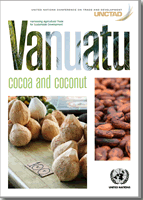
This study is part of a series of UNCTAD publications that focus on upgrading and diversifying specific agricultural sectors of rural economies in developing countries, with a view to raising living standards among small-scale farmers in a context of sustainable development, female empowerment and food security.
The study analyses two agricultural sectors in Vanuatu - cocoa and coconut - in terms of trade-led opportunities, including crop cultivation for biofuel and the development and marketing of cocoa and coconut-based handicrafts and niche/boutique items. It builds on information and recommendations contained in UNCTAD’s Vanuatu’s National Green Export Review (NGER), which highlighted the country’s export competitiveness in the coconut and cocoa sectors.
Vanuatu is at a critical juncture in its rural development pathway. On the one hand, the country faces a pressing need to dynamise its traditional rural economy. On the other hand, there is a need to preserve the existing family-type farming system and its fundamental food security and ecological roles.
According to the study, the challenge is not just to expand the existing traditional farming system, but also to engender a pattern of structural rural transformation. This entails raising agricultural incomes, while generating non-farm income opportunities in rural areas – harnessing synergies between agricultural upgrading and agro-processing, handicrafts and tourism.
While emphasising positive impacts of diversification and upgrading trajectories, the study advises care in implementing strategies to minimise potential negative long-term impacts on, for example, staple food production, women or ecosystems.
The study concludes by highlighting key areas of policy intervention to integrate a socially-inclusive, ecologically-based agronomic model into sectoral trade arrangements and policies.
These focus on the need to:
Strengthen multi-stakeholder dialogue and policy coherence, both vertically and horizontally in order to create consensus and mainstream sustainability into the agricultural trade with a mix of incentives and command and control regulation.
Articulate a locally-adapted ecologically-based agronomic model, agreed and defined by stakeholders, with a focus on sustainability and social equity.
Preserve customary tenure arrangements, within the context of Vanuatu’s current mixed system of land ownership and use, while unlocking the commercial value of land, by finding a middle way between custom and formal land regimes.
Promote the uptake of Vanuatu’s organic-by-default agronomic model among buyers and investors in the context of trade arrangements and certification schemes.
Enhance market transparency so famers have access to current information on prices, quantities, marketing costs, quality standards and other market conditions at different locations or different points along the marketing chain.


